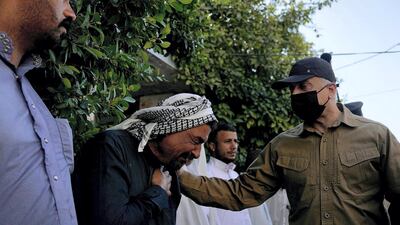Iraqi Prime Minister Mustafa Al Kadhimi vowed to prevent the return of sectarian violence in Iraq as he travelled to Salahuddin province a day after eight men were abducted and murdered.
At least 12 men were kidnapped around noon on Saturday in the Farahatiya district of Salahuddin north of Baghdad, Governor Ammar Jabre said. An hour later, eight bodies were dumped in an open area with gunshot wounds to the heads and chests, he said. Four others were still missing as of Sunday.
No group has claimed responsibility and investigations are ongoing.
“There will be no return to sectarian killings of an Iraqi against another for political purposes. We passed that hurdle together and we will not go back,” Mr Al Kadhimi tweeted as he chaired an urgent meeting of the National Security Council late on Saturday and denounced the attack as a terrorist action.
On Sunday morning, he arrived in Salahuddin Province and met the families of the murdered men. He was accompanied by security officials, the ministers of defence and interior as well as the head of the PMF, Faleh Al Fayadh.
“Our message to the citizens of Salahuddin is that the government will protect them,” the prime minister said as he promised to bring the perpetrators to justice.
Pictures of the dead men, their hands bound behind their backs, flooded social media soon after the incident, enraging the men's Sunni community.

Iraqi politicians are struggling to control extremist groups, including ISIS, as well as rogue militias operating loosely under the banner of the government-sanctioned paramilitary umbrella group, known as the Popular Mobilisation Forces (or Hashed Al Shaabi).
Sunni politician Muthana Al Samarie called for all outside armed groups to leave, saying “this is a new crime added to the list of crimes carried out by the outlawed militant groups.”
“All militant groups that are linked to political parties or those trying to be linked to the Popular Mobilisation Forces [state-sanctioned paramilitary troops] must leave our province immediately,” Mr Al Samarie added, referring to the Iran-backed, largely Shiite militias.
He said that only security forces made up of residents of the province should stay and demanded the investigation be concluded in no more than 72 hours, otherwise all options were on the table "to take political and legal actions."
The PMF was established in 2014 to fight ISIS militants who then controlled nearly one-third of the country. They have since gained a powerful foothold in Iraq's security structure, with some operating outside the control of the Iraqi government.
Mr Al Kadhimi has recently vowed to rein in the militias, including those backed by Iran, but has so far failed to do so.
Despite the defeat of ISIS in late 2017, some Shiite militias – mainly those backed by Iran – are still deployed in Sunni areas and near the border with Syria.
Sunnis and international human rights watchdogs have accused the Shiite militias of human rights violations and harassment of Sunnis during and after the fight against ISIS.
The militias and previous Iraqi governments have acknowledged some of the violations but described them as individual acts.


